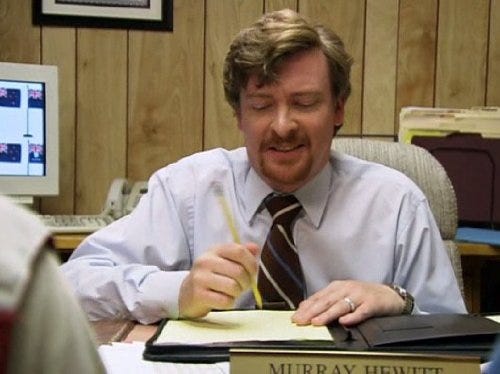Long before he starred in Our Flag Means Death, Rhys Darby was probably best known for appearing in Flight of the Conchords. In the show he portrayed Murray Hewitt, Deputy Cultural Attaché at the New Zealand consulate in New York City and band manager. I bring this up not only because I’ve tied myself to finding some link – no matter how tenuous – to films/tv with these blog posts, but also because Crawford Falconer looks set to leave the Department for International Trade after the UK joins CPTPP and return to his native New Zealand.
This will be a real loss to the UK. I enjoyed working with Falconer during my stint at DIT and his dry sense of humour and wry comments really did brighten up the weekly negotiation update meeting. He also helped to build the department from scratch from one where hardly anyone had any experience with trade negotiations to where it was able to negotiate several ones simultaneously.
It does, however, make perfect sense. During my days advising Truss I was often asked how long I thought I’d stay there. In the end it was a decision that was made for me, but I used to say that I’d go after my two year contract came to an end. This is because I thought by that point all the big and important things would have been done (Australia, New Zealand, CPTPP, and maybe India). I was obviously overly optimistic with my timeframe but it does look like the UK will join CPTPP this year, the plan is to get a deal with India as well in 2023, and as I’ve written before, a deal with the US is highly unlikely in the foreseeable future. In short, although the big, headline grabbing deals that can be done, will be done.
After the UK joins CPTPP and Falconer departs, the government should close down DIT and have the majority of its functions subsumed by the Foreign Office. This is not just the rambling of a bitter former employee, I’ll list my reasons below.
First, it will be an opportunity to make trade boring again. The UK having an independent trading policy for the first time in decades was seen as one of the benefits of Brexit. It certainly was an exciting time but the role of Trade Secretary was seen as something you’d give to somebody who the PM felt should be in the cabinet (for whatever reason) but who you didn’t want to give one of the Great Offices of State to while also making sure they were out of the country a lot. All of this led to a rush to do deals in order to demonstrate to the country and the rest of the world that the UK was back, often at the expense of substance.
I love international trade. Free trade has brought huge wealth and prosperity to the world and has lifted countless people out of poverty. However, modern trade is incredibly technical and ideally the UK’s trade deals would involve eliminating barriers to trade by reforming regulations and rules of origin requirements. Essentially things only nerds who subscribe to Most Favoured Nation or listen to Trade Talks are interested in (I do both these things). I’ve written about this before, but this is what will really create value in trade deals. Moving trade into the FCDO and having it as just one of the things the Foreign Secretary is responsible for should make it less flashy but let our negotiators focus on the things which really matter.
Second, it would make sense from a diplomatic perspective. The UK’s trade policy has sometimes been muddled and disconnected from its diplomatic aims. Although things have improved recently with it being used as a tool against Putin, this has not always been the case. Placing trade in the Foreign Office will help to join things up in terms of foreign policy and help to realise the ambition of Global Britain.
Finally, although one might assume stripping it of its own department might actually diminish trade, placing it in the Foreign Office will actually strengthen it. When I was advising Truss I often found that the jostling for power and influence of politicians and departments meant that DIT was knocked about and undermined. For example, George Eustice at DEFRA seemed to view it as a day wasted if he hadn’t tried to meddle with our trade negotiations on behalf of the farming lobby. Or take the Home Office, it’s paranoia about all foreign people almost scuppered the deal with Australia and has hampered the negotiations with India. I was responsible for overseeing the negotiations with Singapore for a Digital Economy Agreement but the launch was delayed due to an attempted power grab by DCMS. Essentially, stuff people wouldn’t dare try and pull if dealing with the Foreign office or Treasury. Moving trade into the Foreign Office will give it real clout and not be forced to cave into pressure from other departments.
Crawford Falconer is leaving. Sad though this is, it should be seen as an opportunity for the UK to reassess its trade policies and take a more sensible and mature approach.


